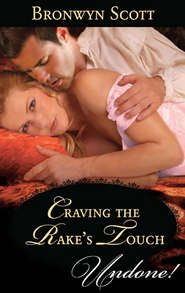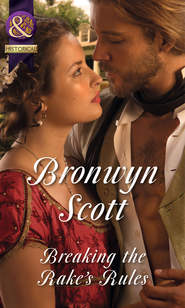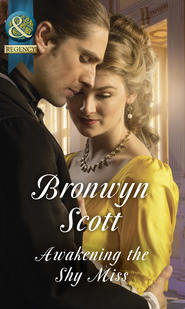По всем вопросам обращайтесь на: info@litportal.ru
(©) 2003-2024.
✖
Prince Charming in Disguise
Автор
Год написания книги
2019
Настройки чтения
Размер шрифта
Высота строк
Поля
It seemed unfair that when he rode through the Hanover villages he saw men younger than he, with far fewer prospects than his, with pretty young wives waiting for them at home and chubby round-faced children to toss in the air while he had riches to command, titles to offer and yet he had no wife.
George threw a small pebble into the basin. He would make a new start tomorrow. He would commission a miniature or two of himself. He knew himself to be not unattractive with his fair hair and square-jawed features. People often said the strong set of his chin hinted at the strength of character beneath. He was of a middling height, although some said ‘short,’ but that was a matter of opinion. He preferred ‘middling.’ But what his stature might lack, the youthful physicality of his body supplied, a fact to which the courtly ladies of Hanover could well attest. Perhaps he’d hire a portraitist as well. The miniaturist would show off his face but he secretly thought in vainer moments his legs were one of his best features with their supple calves, muscled from hunting and horses.
Having a plan soothed his disappointment and he headed back into the palace. His bride was out there, somewhere, he just had to find her. In the meantime there were ladies waiting or ladies-in-waiting, if one preferred.
The Elector of Hanover drummed his long fingers atop the desk. George had taken the news much better than he’d expected. He was just as disappointed with the news as George. In his opinion, the duchess was precisely what George needed in a wife—a young woman with intelligence who would long be at his side, helping him govern with a borrowed intelligence George’s directness lacked. But there would be others to choose from. But who would be best?
His thoughts sifted through conversations and letters he’d exchanged with his mother, the dowager electress, over the past few years. There was one name his mother was fond of interjecting into matrimonial discussions. If only he could remember. Ah, yes, Caroline of Ansbach, if he recalled correctly.
There was a moment of elation at remembering the name. Then he recalled why he’d not seriously pursued the offering in the first place. Caroline’s brother was the Margrave of Ansbach. She had no significant dowry and no family connections to make up for the lack of personal wealth. In fact, she’d been orphaned at the age of eleven. If it hadn’t been for her late mother’s friendship with the Electress of Brandenburg, Caroline might have faded into ignominy.
Therein lay Caroline’s one redeeming asset. The elector remembered now. The Electress of Brandenburg had become the Queen of Prussia three years ago, making Caroline the official ward of King Frederick, a mighty connection indeed. Well, the elector thought with a private smile, if you were only going to have one political connection, it might as well be that one. It was time to revisit the Caroline question.
Chapter Two
The Court of the King of Prussia at Berlin, late November 1704
‘Is that your final answer?’ Frederick, King of Prussia, speared the young woman in front of him with a dark gaze. She held his stare, menacing though it was. He was her guardian, and in the ten years she’d been his ward, his dark eyes and long face had been nothing but friendly. Today that was not the case. Barely disguised anger and disappointment seethed below the surface of his countenance. It took no small amount of courage to offer her response.
‘Yes.’ Caroline fought the urge to glance down at her hands but that would be a show of weakness as she uttered the last. ‘I do not wish to marry the King of Spain.’
Caroline sat alone with the king and queen in a private receiving room set aside for the royal family. Frederick rose to pace, giving full vent to his spleen. ‘The archduke is heir to the King of Spain—he will be the next Holy Roman Emperor.’
‘Titular.’ Caroline managed her objection in a single word.
Frederick rounded on her. ‘Titular? What in the name of all that is holy does “titular” mean?’
‘He is the titular King of Spain. It is a probability that is not as ironclad as they’ve been represented,’ Caroline argued.
‘Is that the only reason you refuse?’ Frederick all but growled.
Caroline swallowed and sighed. They all knew it wasn’t the true reason for refusal. The archduke’s suit had been pressed since the summer in full force. Charles was considered by most of the royal world an ‘amiable prince’ and he’d courted her earnestly, even sending his own priest, Urban, to answer her theological questions. The visits with Urban had left Caroline in tears, however, and had not solidified Charles’s claim for her hand.
‘He is a Catholic and I am not, nor will I be,’ Caroline said resolutely.
Frederick shot his wife a hard look. ‘Who should I blame for this interference? This smells of a Hanover plot to prevent the marriage.’ By ‘Hanover plot’ he meant the queen’s mother, the Dowager Electress Sophia, a powerful, opinionated woman.
Caroline shook her head vigorously. ‘The plot is all mine. I will not convert.’ It was true that her friend, the philosopher Leibniz, who acted as factotum for the Hanover Court, had helped draft her official letter of refusal. But the decision was all hers, based on the convictions she’d shaped after years of being with Sophia-Charlotte at her intellectual court in Lutzenburg.
‘Not for all the riches Charles offers? I know you to be an ambitious girl, Caroline,’ Frederick coaxed, softening just a little. ‘A marriage with Charles would fulfil that ambition.’
She heard the unspoken message: marriage to Charles was far beyond what a girl of her background aspired to. Caroline was well aware the princesses of Ansbach had a history of marrying minor lords or other local gentry and fading into the family tree unrecognised. To be the Queen of Spain far exceeded the achievements of her house to date.
It was not her ambitions alone that would be fulfilled. She heard the other unspoken message as well: ‘After all we’ve done for you, will you not do this one thing for us?’ But she could not relent.
‘I am sorry, I cannot,’ Caroline said simply. ‘I have only one soul.’ It would not be possible to love a man who did not respect her faith. Without that, marriage to Charles would be an empty alliance, an absolute betrayal of herself, no matter how amiable he was reputed to be.
It did not take long for Caroline to realise the king would not forgive her for what he saw as her stubborn and foolish decision. In his anger, Frederick was inclined to make staying in Berlin miserable. Caroline understood his disappointments but could not agree with him. He staunchly believed that princesses did what they were told, and if that meant converting, they converted. It was the axiom by which he ruled his own daughters. Princesses were to be flexible and adaptable. She had proven to be neither.
If this period of difficulty had taught her one thing, it was that she must face the prospect of marriage in the near future. There were those who claimed her a beauty; Charles of Spain had certainly thought so. He’d been ardent in his pursuit of her but he’d never truly thought of her intellect, nor had he truly believed she’d have the learning to resist the persuasions of his priest. That last assumption had upset her greatly. In theory, she’d understood at an early age the nature of political marriages, the idea that she was a prize to be won.
In practice, she’d not quite understood what that meant until recently. Perhaps she’d believed her lack of dowry would protect her from the game of royal alliances. That had proven to be a mistake. The King of Prussia’s ward would not escape notice.
Being a prize did not settle well with her. She was more than a beautiful spoil of politics. She’d been given a great gift of education at Lutzenburg where Sophia-Charlotte had allowed her to sit in on debates even at a young age. She did not harbor misguided romantic expectations about marriage, but she did hope to be a partner to her husband, to enjoy his respect and admiration. In turn, she hoped to visit the same affections on her husband.
Charles of Spain was only one prospect. She was twenty-one now, of perfectly marriageable age. There would be others and soon. She knew Sophia-Charlotte had long harboured desires of a marriage to her son Frederick William. Nothing had come of those desires yet. Caroline was not particularly fond of Frederick. It worried her that in the wake of refusing Charles, the king and queen would re-examine the potential of marrying their son. There would be no refusing another future king a second time.
Her once very certain world was now full of uncertainty.
By December, Caroline had come to the conclusion that remaining in Berlin would take the decision to marry out of her hands. With a sad farewell to Sophia-Charlotte, Caroline packed her travelling trunks and set out for her childhood home in Ansbach. At Ansbach, she’d have her doting brother’s protections. She silently vowed she would marry the first interesting Protestant man who came along.
Chapter Three
Herrenhausen Palace, Hanover, spring 1705
It was with great excitement that George answered his father’s summons on a warm spring morning. The leaves were green, the sky was blue, early flowers were blooming in a profusion of colours throughout the Herrenhausen gardens. Spring was in the air and in his veins. George could nearly feel it thrumming in his very pulse. He was acutely aware of being a man in his prime and the vigour of youth coursed through him fast, hard and hopeful, and not without reason.
With the coming of spring and the thawing of the ground had come the thawing of his matrimonial hopes, which had predictably frozen with the roads. Winter made courier runs irregular at best. At least his hopes had frozen on a high note, giving him something to sustain him through the long winter. His grandmother, the dowager electress, had put forth a name as a prospective bride and a glowing description of the young woman’s virtues. Caroline of Ansbach. George had never met her but thoughts of her lovely attributes had kept his mind and heart much occupied through the cold German nights. Now it was time to see what would become of those hopes.
His father barely waited until they were alone in the grand office of Herrenhausen Palace before he said the words George had waited the winter to hear. ‘I think it’s time to go to Ansbach.’
‘Perhaps I might take grandmother’s ring,’ George ventured hastily. He’d long imagined how this meeting might play out. This would be an honest courtship between two people. In this matter, he would represent himself. He would see her and judge her on his own. She would be able to do likewise. It would be an enormous compliment to her that he wanted her to judge him on his merits, not the merits described in letters from political dignitaries.
Вы ознакомились с фрагментом книги.
Приобретайте полный текст книги у нашего партнера:
Приобретайте полный текст книги у нашего партнера:











